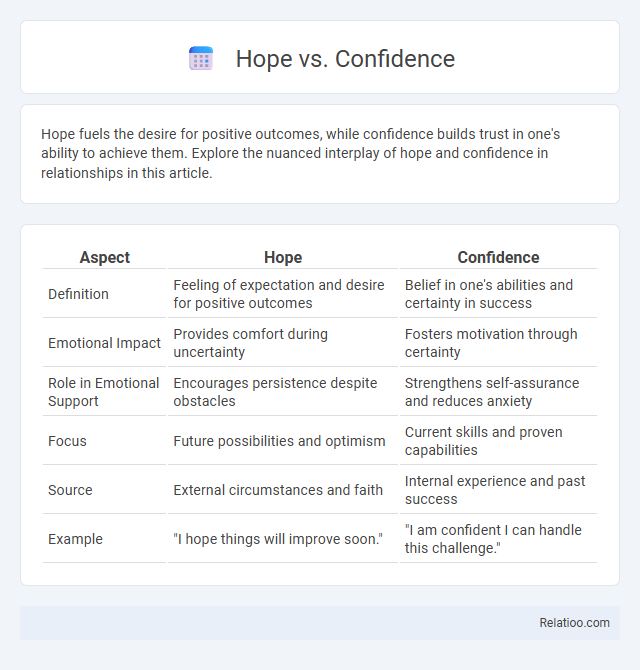Hope fuels the desire for positive outcomes, while confidence builds trust in one's ability to achieve them. Explore the nuanced interplay of hope and confidence in relationships in this article.
Table of Comparison
| Aspect | Hope | Confidence |
|---|---|---|
| Definition | Feeling of expectation and desire for positive outcomes | Belief in one's abilities and certainty in success |
| Emotional Impact | Provides comfort during uncertainty | Fosters motivation through certainty |
| Role in Emotional Support | Encourages persistence despite obstacles | Strengthens self-assurance and reduces anxiety |
| Focus | Future possibilities and optimism | Current skills and proven capabilities |
| Source | External circumstances and faith | Internal experience and past success |
| Example | "I hope things will improve soon." | "I am confident I can handle this challenge." |
Defining Hope and Confidence
Hope represents a positive expectation for a desired outcome, often without certainty or concrete evidence, while confidence is a firm belief in your abilities or the likelihood of success based on experience or knowledge. Your hope motivates perseverance despite uncertainty, whereas confidence provides assurance grounded in skills or past achievements. Understanding the distinction between hope and confidence helps you set realistic goals and build resilience in challenging situations.
Psychological Foundations of Hope
Hope, rooted in psychological foundations, involves a positive motivational state based on goal-directed energy (agency) and planning to meet objectives (pathways). In contrast, confidence primarily reflects self-assurance in one's abilities, often linked to past performance and perceived competence. While hope encapsulates both emotional and cognitive components fostering resilience, confidence centers on strength derived from skill mastery and experience.
The Science Behind Confidence
Confidence stems from neural processes involving the prefrontal cortex and amygdala, regulating self-assurance and risk assessment. Unlike hope, which is future-oriented and emotionally driven, confidence relies on past experiences and evidence-based beliefs in one's abilities. Your brain's ability to reinforce positive outcomes strengthens confidence, creating a feedback loop that enhances performance and decision-making.
Key Differences Between Hope and Confidence
Hope involves a desire for a positive outcome without certainty, while confidence is the firm trust in one's abilities or the likelihood of success based on evidence or experience. Hope is often future-oriented and emotional, whereas confidence is grounded in past accomplishments and knowledge. The key difference lies in hope being passive optimism and confidence being active assurance.
How Hope Influences Decision-Making
Hope fuels decision-making by fostering a positive outlook on potential outcomes, motivating individuals to pursue goals despite uncertainty. This optimistic mindset enhances resilience, allowing for adaptive strategies when faced with obstacles. Unlike confidence, which relies on past success and assured abilities, hope centers on possibilities and promotes persistent effort through challenges.
The Role of Confidence in Achieving Goals
Confidence plays a critical role in achieving goals by empowering You to take decisive actions and persist through challenges. Unlike hope, which is based on desire or wishful thinking, confidence is rooted in self-belief and proven abilities that drive consistent progress. Developing confidence strengthens motivation, increases resilience, and enhances goal attainment by transforming aspirations into measurable achievements.
Hope vs Confidence in Overcoming Failure
Hope fuels persistence during failure by inspiring belief in positive outcomes despite challenges, whereas confidence stems from past successes and skills that directly empower problem-solving abilities. Hope maintains motivation through uncertainty, enabling individuals to envision future possibilities, while confidence provides a sense of control and readiness to face obstacles based on experience. Combining hope's forward-looking optimism with confidence's assurance creates a balanced mindset essential for resiliently overcoming setbacks.
Cultivating Hope: Practical Strategies
Cultivating hope involves setting achievable goals, fostering a positive mindset, and developing resilience through consistent practice and support networks. Confidence stems from competence and past successes, while hope emphasizes future possibilities and emotional perseverance. Techniques such as visualization, mindfulness, and gratitude exercises effectively enhance hope and empower individuals to navigate challenges with optimism.
Building Lasting Confidence: Expert Tips
Building lasting confidence requires consistent practice, realistic goal-setting, and a positive mindset that embraces challenges as opportunities for growth. Experts emphasize the importance of self-awareness and resilience in transforming fleeting hope into enduring confidence, allowing you to face adversity with courage and determination. Integrating these strategies into daily routines enhances your ability to maintain confidence even in uncertain situations.
Balancing Hope and Confidence for Success
Balancing hope and confidence is crucial for achieving success, as hope provides the motivation to pursue goals despite uncertainty, while confidence ensures a realistic belief in one's abilities. Overreliance on hope without confidence can lead to unrealistic expectations, whereas excessive confidence without hope may result in complacency. Integrating both hope and confidence enables individuals to maintain resilience and execute effective strategies in the face of challenges.

Infographic: Hope vs Confidence
 relatioo.com
relatioo.com